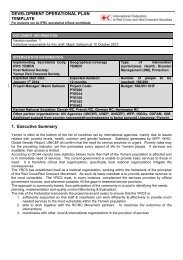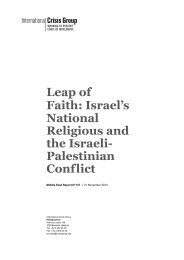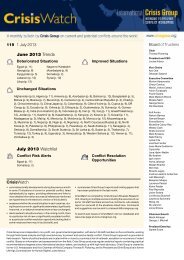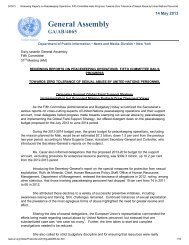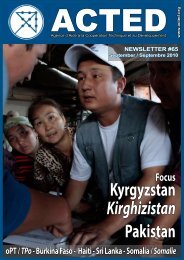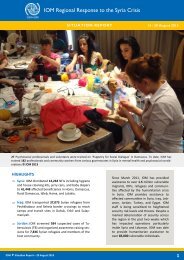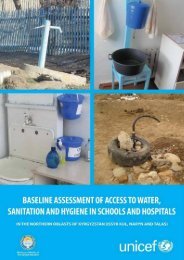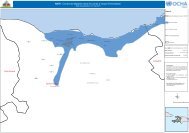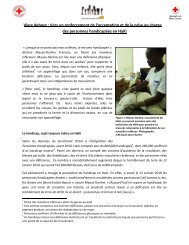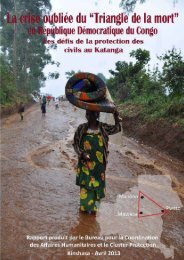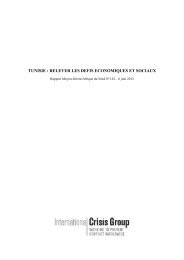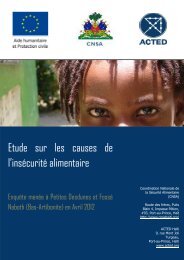SOMALI NUTRITION STRATEGY 2011 – 2013 - ReliefWeb
SOMALI NUTRITION STRATEGY 2011 – 2013 - ReliefWeb
SOMALI NUTRITION STRATEGY 2011 – 2013 - ReliefWeb
Create successful ePaper yourself
Turn your PDF publications into a flip-book with our unique Google optimized e-Paper software.
62 The advantages of LNS pertinent to the Somali context include: LNS are high quality fortified<br />
foods that can be used at home without the need for water or premixing or cooking; they are stable<br />
and resistant to spoilage, the micronutrients do not interact; they provide additional energy and<br />
increase energy density of complementary foods; they have been proven to improve linear growth<br />
of young children and proven more effective than CSB in supplementary feeding of moderately<br />
malnourished children (Nackers et al 2010). LNS in the form of the product ‘Plumpy Doz’ has been<br />
used in Somalia under operational research conditions. However with high prevalence of acute<br />
malnutrition and limited contacts with beneficiaries, evaluating and documenting impacts have<br />
proved difficult. Thus cost compared to nutritional benefit is as yet undetermined in the context.<br />
Outcome 2 Sustained availability of timely and quality nutrition information and<br />
operational research into effective responses to the causes of undernutrition<br />
Quality and timely nutrition information is essential to defining appropriate & feasible nutrition<br />
response options. Whilst more is known about the underlying causes of undernutrition throughout<br />
Somalia from KAPs 2007, the national micronutrient and Anthropometric Survey 2009, FSNAU<br />
data, less is known about the types of interventions that can impact on the problem, particularly<br />
in the Somali context. Operational research is therefore key to providing the evidence base on<br />
which appropriate programmes can be planned.<br />
Outcome 3 Increased appropriate knowledge, attitudes and practices regarding infant,<br />
young child and maternal nutrition<br />
KAPS 2007 and Micronutrient survey<br />
2009 reveal the extent of inappropriate<br />
knowledge, attitudes and practices<br />
regarding infant, young child and maternal<br />
nutrition throughout Somalia. Rates of<br />
exclusive breastfeeding are extremely low<br />
at around 5% (National Micronutrient and<br />
Anthropometric Nutrition survey 2009).<br />
According to KAPS 2007, the practice<br />
of discarding colostrum is widespread.<br />
Infant formulas are vigorously promoted<br />
in a context of widespread poor water,<br />
sanitation and hygiene conditions. In<br />
contrast, the Lancet series on Maternal<br />
and Child Undernutrition 2008 identifies<br />
that exclusive breastfeeding in the first<br />
six months of life is particularly beneficial<br />
while infants who are not breastfed in the<br />
Poor infant and young child feeding practices, including<br />
bottle-feeding in deplorable conditions is a predisposing<br />
factor to diarrhoea and malnutrition, FSNAU, Dec, 2009<br />
first month of life may be as much as 25 times more likely to die than infants who are exclusively<br />
breastfed. Continued breastfeeding is also very critical to improve feeding in children 6-23 months<br />
of age, as breast milk is an important source of energy and nutrients in the child’s diet.<br />
The Lancet series on Maternal and Child Undernutrition 2008 shows that both individual and<br />
group counselling have been demonstrated to extend the duration of exclusive breastfeeding. In<br />
Somalia individual counselling of mothers on appropriate breastfeeding practices and improving<br />
family and community understanding and support for early initiation and exclusive breastfeeding to<br />
six months are important. However, the other key priority is to address the vigorous advertising of<br />
breast milk substitutes by engaging with importers and traders. While the absence of a legislative<br />
framework is appreciated, it is important that a longer term consultative process on adoption of<br />
the International code for marketing of Breast milk substitutes is initiated.




